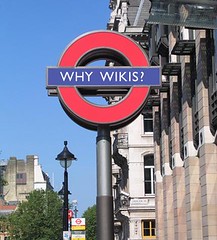 Jee wiz these weeks just go by so fast! I see that some of us have used the week to catch up a little, or simply get some breathing space, but we need you all back now, because things are about to get interesting...
Jee wiz these weeks just go by so fast! I see that some of us have used the week to catch up a little, or simply get some breathing space, but we need you all back now, because things are about to get interesting...- This week we will begin organising our course mini conference where you will each facilitate an online session. We will use a wiki to coordinate our events, so we can each experience collaboration through a wiki. Online communities through wikis are harder to identify as they usually focus around the creation of content. Wikis usually have a discussion tab with each page, and you can sometimes see community like communication there.
To do
1. Write to your blog the initial ideas you have for your assignment 2 - facilitating your event in the course mini conference. Describe who or what you plan to bring to the group and through what channel of communication.
2. Add your proposed event to the course mini conference web page, and use that wiki page's discussion tab to negotiate and discuss and develop the mini conference. Ie. start a discussion forum thread for your proposed event and discribe your idea in more detail, including any questions or concerns you have that the group may be able to help with. Respond to other people's threads and get the wiki happening.
3. Join in a webconference to discuss the up coming course mini conference and everyone's thoughts and ideas for it. Meeting 1 will be at UTC 9pm 29 September 2008 (what time is that for you?), and meeting 2 will be at UTC 8am 30 September 2008 (what time is that for you?). Both meetings will be in the the 24/7 meeting room.
Extra resources
- Video by CommonCraft on Blip.tv: Wikis in Plain English
- Help with using a MediaWiki
- Harold Rheingold's video interview with Mark Elliot about the use of a wiki for Melbourne's city plan, and about the concept of stigmergy. Many thanks to Cathy Deckers for the find.
- Information Literacy And Web 2.0: The Wild, Wild Wiki Wiki / Wiki Writing: Collaborative Learning in the College Classroom
- Rough Type: Nicholas Carr's Blog: Nature's Flawed Study of Wikipedia's Quality - Kapor's remarks inspired me to take a look at that much-cited Nature article. I found that it was something less than I had expected.
- Abject Learning: Is murder, madness and mayhem the future of higher education? - I decided to include wikipedia as a central part of a course I was teaching in the belief that it was only by actively contributing to the encyclopedia that they would learn about its weaknesses, and also its strengths.
- What to Do With Wikipedia By William Badke. Often banned by professors, panned by traditional reference book publishers, and embraced by just about everyone else, Wikipedia marches on like a great beast, growing larger and more commanding every day. With no paid editors and written by almost anyone, it shouldn’t have succeeded, but it has. In fact, it’s now emerged as the No. 1 go-to information source in the world. It’s used not only by the great unwashed but also by many educated people as well. ONLINE reported on the Pew Internet & American Life Project’s findings that 36% of the American population regularly consult Wikipedia (July/August 2007, p. 6).


